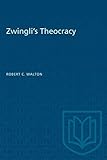Zwingli's Theocracy / Robert C. Walton.
Material type: TextSeries: HeritagePublisher: Toronto : University of Toronto Press, [1967]Copyright date: ©1967Description: 1 online resource (280 p.)Content type:
TextSeries: HeritagePublisher: Toronto : University of Toronto Press, [1967]Copyright date: ©1967Description: 1 online resource (280 p.)Content type: - 9781487572921
- 9781487584917
- 321.5
- BR345 .W3
- online - DeGruyter
| Item type | Current library | Call number | URL | Status | Notes | Barcode | |
|---|---|---|---|---|---|---|---|
 eBook
eBook
|
Biblioteca "Angelicum" Pont. Univ. S.Tommaso d'Aquino Nuvola online | online - DeGruyter (Browse shelf(Opens below)) | Online access | Not for loan (Accesso limitato) | Accesso per gli utenti autorizzati / Access for authorized users | (dgr)9781487584917 |
restricted access online access with authorization star
http://purl.org/coar/access_right/c_16ec
Zwingli has long been the subject of much academic and religious speculation. Previously, this speculation has been based on what Professor Walton considers a false premise: that Zwingli advocated domination of the government by the clergy. He suggests that the term "theocracy" itself is often misunderstood and that in fact Zwingli did not originate the theory of government which is so often attributed to him. Professor Walton finds a discrepancy between the findings reached by the secondary works on the subject and what Zwingli himself said and did. Few of the authors consulted agreed upon Zwingli's conception of the two offices of magistracy and clergy, but all insisted that Zwingli was the advocate of "theocratic" government at Zurich. The material drawn from primary sources indicates that although Zwingli was a defender of a theory of government which envisaged a co-operation between the spiritual and secular authority in a Christian society in order to realize the Will of God, he was not the proponent of a "Theocracy" as the term is understood by modern writers. Professor Walton's research reveals a close connection between the actual development of the relationship of the clergy and the secular magistracy at Zurich, both before and during the Reformation, and Zwingli's conception of what it should be: his success was due to the fact that his formulation of a Church-State entente conformed to pre-existing conditions in Zurich. Zurich was dominated by a corporate theory of government and society which had already allowed the magistracy, representing a Christian people, to take on a semi-sacral character and function. Zwingli's own conception presuposed both the corporate theory of society and the role which the government already occupied in the affairs of the church. The development of his thought was conditioned by these factors from the very beginning of his career at Zurich and reveals a consistent growth throughout the remainder of his life. With emphasis on the words and actions of Zwingli himself rather than on secondary sources, this close and well-documented study offers an accurate guide to the understanding of Zwingli's thought.
Mode of access: Internet via World Wide Web.
In English.
Description based on online resource; title from PDF title page (publisher's Web site, viewed 01. Nov 2023)


